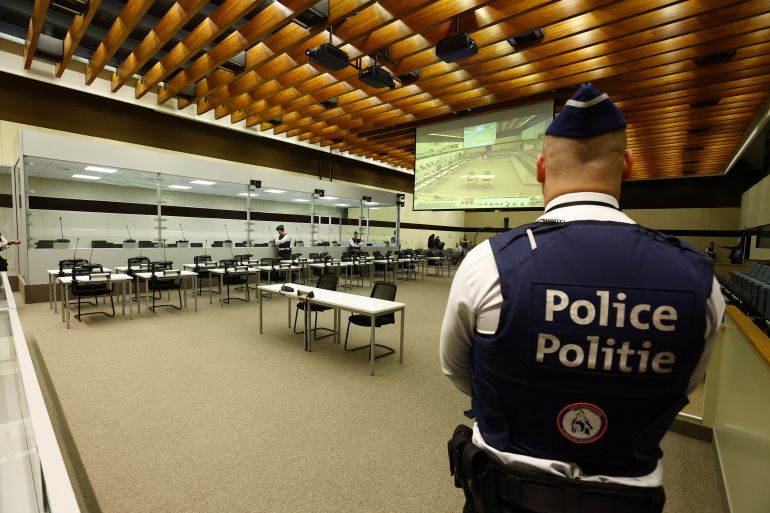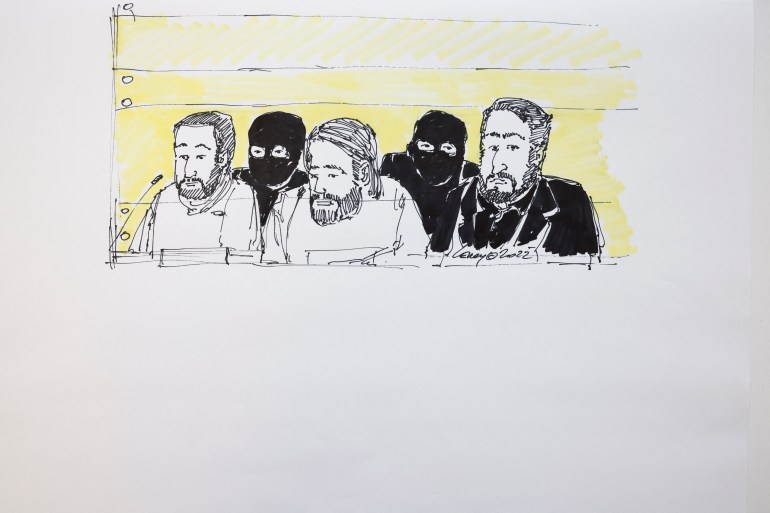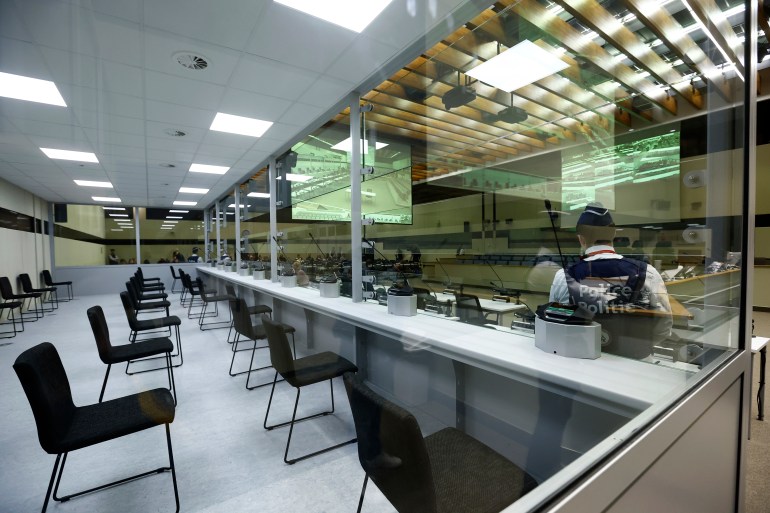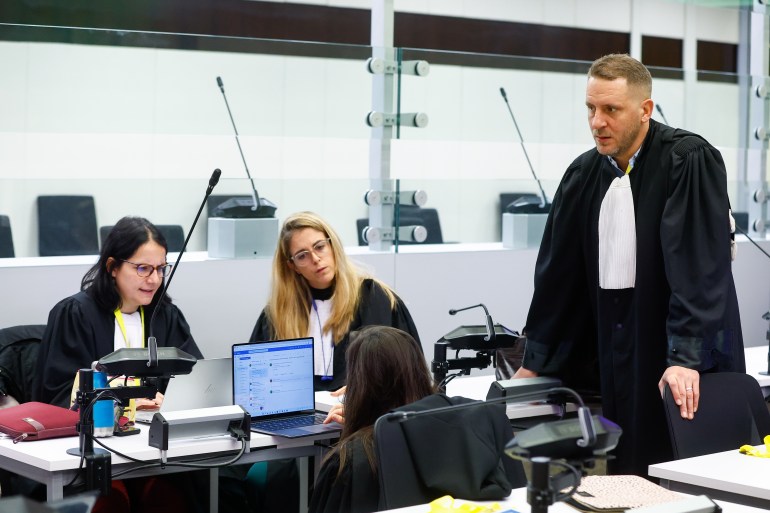Belgium’s 2016 suicide bombings trial: Five things to know
Six and a half years after the Brussels suicide bombings, the trial of 10 men is set to begin on December 5.

On March 22, 2016, two coordinated suicide attacks shook Belgium’s capital Brussels, killing 32 people and injuring more than 300.
The first attack took place at the Brussels Airport in Zaventum, where two twin suicide blasts occured in the airport’s departure hall at 7:58am local time (06:58 GMT).
Keep reading
list of 2 items2016 Brussels attacks: On anniversary, Muslims remain stigmatised
“I was queueing for my boarding pass at the airport to fly back home to Bogota, Colombia. Suddenly, I heard a blast and I could only see a sort of bright light in front of me for a couple of minutes. I recall my body heating up and I felt like a lot of objects were hitting me. It was all very confusing, but I instantly knew it was a terrorist attack,” Felipe Duque, who was in Brussels for work at the time, told Al Jazeera.
“I was severely injured and was in a coma for three weeks after the attacks,” he added.
An hour after the airport attacks, another suicide bomb exploded in the middle carriage of the line 5 train, just as it arrived at the Malbeek metro station, located near the EU institutions in Brussels.
“I was on that train and the loud explosion affected my hearing,” Nic Reynaert, a lawyer based in Brussels, told Al Jazeera.
Perpetrators of attack
The ISIL (ISIS) armed group claimed responsibility for the attacks and three of the perpetrators from the group – Khalid el-Bakraoui, Ibrahim el-Bakraoui and Najim Laachraoui – were also killed in the attacks.
Charles Michel, Belgium’s prime minister at that time referred to the attacks as “blind, violent and cowardly”. The country also raised its threat level to its highest and declared three days of national mourning.
Since then, Belgium’s police authorities have arrested 10 men who were allegedly directly or indirectly involved in the attacks. Some of the accused are also suspected of having links to the November 2015 attacks in Paris, France.
Six-and-a-half years later, the trial of these 10 men is set to begin on December 5 at Belgium’s Court of Assizes – the court which deals with the country’s biggest criminal cases and was also NATO’s former headquarters in Belgium.

The prime French suspect in the dock on November 30 confirmed his identity as proceedings began: “Abdeslam Salah, 33, electrical mechanic.”
Only one of the nine defendants present on Wednesday, 30-year-old Osama Krayem, refused to stand as they were presented to the high-security court.
A 10th suspect, 33-year-old Oussama Atar, is believed to have been killed in Syria.
The hearing kicked off a selection for the jury drawn from a huge poll of more than 1,000 citizens.
Here are five things to know about the trial:
Critical trial
This is the largest criminal trial Belgium has ever carried out and is expected to last for months.
The onset of this trial is also a step forward in Belgium and Europe’s fight against “radicalisation”, according Brussels-based criminal lawyer Olivia Venet.
“This is a trial of the accused, and will legally investigate what happened on that fateful day in March and ensure justice is served to the victims,” Venet, who is part of a collective of lawyers representing the victims of the attacks, told Al Jazeera.
“While the court’s verdict could take time, the fact that this trial is beginning also shows that Belgium is keen to fight against radicalisation according to the rule of law,” she added.
For Duque, the trial is a moment to give the victims a stronger voice.
“Over the past few years, I feel all the attention has been on the accused. Yes, it is important to fight terrorism and ensure they are punished. But as victims, many of them are still suffering physically and mentally and feel like they have been forgotten. Some victims haven’t got enough support from the government to cover all their medical expenses,” he said.
“But with the trial beginning, it is a chance for the Belgian government, the media and society to listen to the victims once more and cater to our needs,” he said.
Why trial was delayed
The trial was initially meant to begin in October 2022. But it was delayed after a preliminary hearing in September ended in controversy over “glass boxes”.
Belgian police authorities set up glass boxes for the accused in the court for “maximum security”.
While the boxes were ventilated and documents could be passed through them, the lawyers of one of the defendants Salah Abdeslam – who has already been imprisoned for his role in the Paris 2015 attacks – said that the cubicle degraded the rights of the defence.
This led the court’s President Laurence Massart rule that the glass cubicles for defendants violated human rights and until an alternative was found, the trial had to be delayed.
But now this has been modified, according to Venet, and the defendant’s area in the court is a single shared space from where they will testify.
Venet also acknowledged that while the delay in the trial is not ideal for the victims, it is important to ensure every aspect of criminal trials is thorough.
“Immediately after the attacks, it took us a lot of time to identify the suspects correctly, double-check witness’ testimonies and also coordinate our findings with judges in France since some of the perpetrators had links to the Paris 2015 terror attacks,” she said.
“Complicated criminal cases in Belgium usually take a year or two for the verdict to be delivered. This case is extraordinary with suspects and victims from different nationalities. So we had to take our time researching the case so that justice can be delivered efficiently,” she added.

Meanwhile, the trial will also have a public jury, who have been selected on November 30.
But Pieter Van Ostaeyen, a historian and researcher on armed attacks in Belgium, said that this aspect of the trial is not ideal.
“Selecting a jury comprising people from the society instead of professionals who have knowledge of terrorism cases, could result in a judgement being made entirely based on emotions,” he told Al Jazeera.
But Venet said that most criminal cases in Belgium proceed with a public jury.
What do the victims want?
For victims and their families, the onset of the trial is something they hope will give them closure from everything they experienced in March 2016.
Some of them are expected to attend the trial on December 5 and for those who cannot, tuning in online will be made possible.
“I can never forgive the defendants because what they did, changed my life forever. I have four children and back then, my youngest was just three years old and I just forgot how to be a mom because of the post-traumatic shock I was suffering from,” Ingels told Al Jazeera.
“Even today, I take antidepressants and sleeping pills because I still have a lot of nightmares about that day. I hope this trial will allow me to move forward and perhaps close that page,” she added.
Meanwhile, Reynaert, a victim who escaped the Maelbeek station attack, highlighted that victims need more support from the government.
“So far, it’s been a joke because victims have just been forgotten. All the money is being used for the trial of the accused. They will be punished, but they will still get better treatment in prison, get food, will be entitled to rehabilitation training. Meanwhile, we have to continue struggling,” he said.
Duque shared a similar view.

“I have a strong bond with Belgium having lived there for five years and I love the country. But with this attack, justice will truly be delivered if all the victims are compensated and get more support from the government,” Duque said.
While Duque was supported financially by his employer in Belgium, he and many other victims sought mental and legal support from Life4Brussels, which was set up a day after the attacks to support victims.
Two months after the attacks, Belgium’s Parliamentary Committee on Justice raised the financial support level, enabling victims to claim up to 125,000 euros (about $130,000) for medical and psychological support.
A single point of contact has also been set up by the justice ministry, but some victims had to still fight for compensation.
“It took a while for the Belgian government to recognise me as a victim because I wasn’t physically injured. But I was still at the airport and had a lot of mental health problems after the attacks. The government needed you to have been hospitalised for at least a day to get compensated,” Sylvie Ingels, a Brussels-based victim who also survived the attacks at the Brussels airport, told Al Jazeera.
“I fought for support so I could afford to go to a psychologist and eventually got it, but many other victims are still struggling. So, the onset of the trial will hopefully amplify victims’ struggles over the past six-and-a-half years and trigger more government support,” she added.
How trial affects Belgium’s approach to radicalisation?
Van Ostaeyen also highlighted that the onset of the trial is a moment for Belgium to remember to continue tackling radicalisation.
“In 2016, ISIL’s terrorist activities and radicalisation initiatives in Europe were at a very high level. Since then their activities have been more small-scale and are taking place in Africa, Syria and Iraq. While the official terror threat level still remains high in Belgium and security efforts have been expanded, I have not seen any new initiatives to tackle radicalisation efficiently,” he said.
“Many of the accused became radicalised because they never truly felt at home in Europe. I remember the spokesperson of Sharia4Be – a Belgian radicalisation organisation – saying that in Belgium they are considered Moroccan and in Morocco they are considered Belgian, making them feel like they don’t belong anywhere. So this makes them join terrorist groups where they feel like they belong,” Ostaeyen said, adding that it is important for Belgium to tackle this by improving its existing integration initiatives.
What can we learn from the case?
Duque and Ingels hope this case will give them closure and tackle “terrorism”, they both highlighted that this entire ordeal should not trigger hatred towards Muslims.
“Some of the defendants lived in the Molenbeek neighbourhood of Brussels, which has got the tag of ‘terrorist neighbourhood’ and people who believe in Islam living there, continue to be stigmatised. That needs to stop,” said Duque, adding that he holds no grudge towards Muslims after the attacks, and believes that “terrorists” have no religion.
“My husband is of Moroccan origin, and we ourselves are Muslims. I can assure you that if anyone did such a thing in Morocco, they would get the toughest sentence. Tougher than what is being offered in Belgium,” said Ingels.
“The more important thing to remember in terrorist cases is that the accused receive the toughest sentence and victims get the maximum support,” she said.